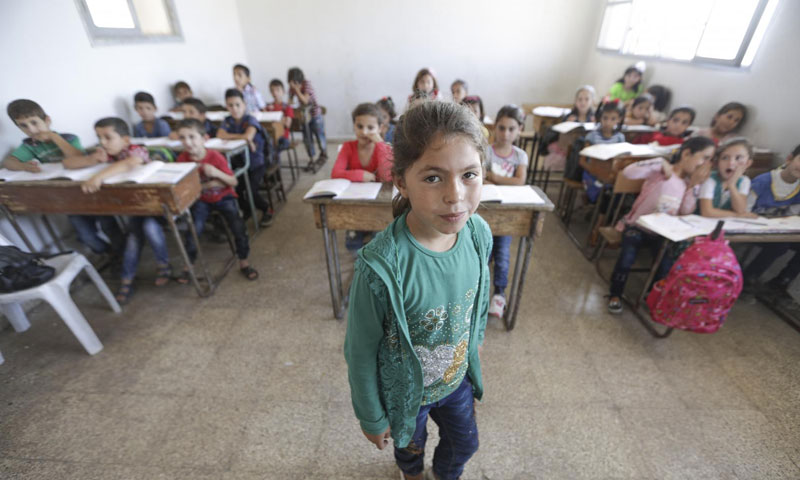



Ahmad, a 12-year-old boy, could not keep his excellent preliminary school records the same in the town of Arnibeah in the Shashabo Mountain, north-western rural Hamma, for he lacked some of the school books, the thing which negatively affected his marks, compared to those of previous years.
The majority of the schools in Idlib governorate and the western rural parts of Hama and Aleppo are suffering from a shortage of school books of various grades, causing a gap in the educational process and having a negative impact on both staff and children.
The civil community organization cuts of the funding they offer to the Syrian Interim Government contributed to “the suspension of book printing process,” especially those of preliminary school, in Idlib governorate, which Imad Barq, the minister of education of the Syrian Interim Government, considers as “the main cause” to this phenomenon.
The Interim Government, especially in relation to the education sector, depends on the civil organizations, which fund all the projects relating to book printing, the renovation and rehabilitation of schools and the salaries and training of teachers, according to Barq.
Last school year, the Qatar Charity Fund supported the book printing project in the majority of Northern Syria’s areas, but it stopped this year, and no other organization offered to fund yet.
The fluctuating political and security conditions in the area made the delivery of books to some schools difficult, in addition to the massive intervention of military sides in the educational process and the lack of unified curricula in Idlib governorate.
Negative Impact on the Education Sector
A teacher at the city of Ariha, on the condition of anonymity, explained that this phenomenon contributes to the creation of a state of confusion among many of the teachers, lack of information and the canceling of some of the important lessons from the curricula.
The students are the most affected, as they are forced to put a greater and more difficult efforts to memorize the information and summarize them, or transferring them to paper mistakenly, especially when the teachers give them lessons that are not included in the curricula as to overcome the gap in the books.
The teacher added that the war, displacement and some children’s absence from schools for long periods caused serious problems at the level of writing and reading.
In the shadow of lacking books, it becomes difficult for these children to continue their education.
The Interim Government estimates the shortage of preliminary school books with 80%, for only 20% of the students and the teachers’ need for books is covered.
As for the books needed for the preparatory school, 50% only of the schools’ needs is covered by the “Free Education Directorate,” while the lack in high school books is massive, reaching 80%.
Nuha, a 28 years old mother to three children in the city of Kafr Nabl, southern Idlib, complains about her inability at teaching her children as she faces certain difficulties in explaining them some subjects due to lacking books of the major subjects.
Most of the schools in Idlib and the liberated areas of Northern Syria depend on the curricula of the “Syrian Interim Government.”
While books are not printed, many schools have used the old books of the Syrian regime, after “some of the titles were modified and adapted to the current situation,” the teacher added.
Some school directorates were able to hand over “very old” books, making it difficult to teach, according to Nuha, who said: “There are additional texts in the book, in addition to the original text required by the school.”
Some students photocopy books, contained by private libraries, which has caused a financial burden for a large proportion of students.
The prices of books vary according to the educational level, preliminary, preparatory or high school, in addition to the quality of the books, secondhand or new, and prices range from two thousand to six thousand Syrian pounds per book.
Most of the teachers’ efforts have failed to solicit support from civil organizations for funding the “book printing” project, with the exception of the ” Kesh Malek” organization in rural Aleppo, which is working on the printing of textbooks.
The Syrian Interim Government asked the organization to expand the project as to cover the areas of Idlib governorate, according to the Minister of Education Imad Barq, in addition to the government’s filing more funding requests to several civil organizations.
The educational sector in Idlib is enduring many difficulties under the deteriorating security conditions, children dropping schools out and joining the labor market, and the interference of three ministries of education in the process, the Salvation Government, the control of which expanded this year, the Interim Government, which established and supported the directorates of education, and the Syrian regime’s government that still pays the salaries of some teachers in the governorate.
Raqqa’s Children Receive Their Education in Windowless and Doorless Schools
if you think the article contain wrong information or you have additional details Send Correction